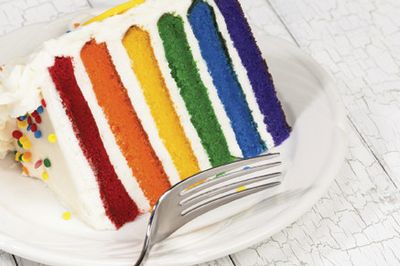By Liz Massey, Dec. 18, 2014.
A couple of months ago, I was hanging out at the house of a gay male friend I’ve known since I was 19. Like me, he left the Midwest when he was in his late 20s and landed in Phoenix.
On this visit, I spied a bit of reading material I hadn’t laid eyes upon for nearly two decades: a community cookbook produced in 1990 by Phoenix Books – a women’s bookstore that, when I first graduated from college, was the center of my LGBT universe.
I spent 10 or 15 minutes giggling contentedly as I paged through the cookbook before my host directed my attention back to the present moment. During that brief interval, it was as if I had boarded a paper-based time machine and was walking around the old neighborhood of the bookstore, which was packed with welcoming restaurants, coffee shops and retail stores.
After I put down my friend’s copy of the cookbook, the metaphor of intentionally “baking” a community got stuck in my mind. Whether or not we whip out a recipe card when we make something like cupcakes, there are certain necessary ingredients. In much the same way, a functional queer community has always had some foundational elements, although they may come together a little differently now than they did before the turn of the last century. Either way, I can see that all communities need the following:
A hub. Back in the pre-Internet era, people sought a safe physical space in which to gather. Today, we still need safe space, but we also expect the online versions of our connecting organizations to be free of harassment or intimidation, too.
A focus. Women’s bookstores had a long history of functioning as information clearinghouses for services for the entire community, men included. More recently, our community groups have become more specialized, taking charge of more narrow bands of service and activity.
A mission. In the beginning, it was enough that our little groups shared updates on the climate for LGBT people (which was frequently so bad it often demanded an immediate response), and survival was the overarching goal. As our groups have become more professional, we’ve scaled up our expectations and look for them to present a cohesive set of services to our population.
A network.Phoenix Books hosted a lot of coffeehouse concerts by traveling musicians, and those were the “mixers” where you could meet your next date. Today, almost all queer networking starts online – and not just for dating or hooking up, either.
As much as I enjoyed leafing through the Phoenix Books cookbook, I’m about as likely to use a recipe out of its pages as I am to cook something from my grandmother’s church cookbook. I’m just not that much of a recipe follower! But in both cases, the cookbook itself is the final “dish” that I’ve come to savor from these organizations, one that will feed my memory for years to come.
